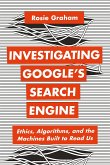
Broschiertes Buch
Ethics, Algorithms, and the Machines Built to Read Us
12. Januar 2023
Bloomsbury Publishing PLC
| eBook, ePUB | 19,95 € | |
| eBook, PDF | 19,95 € |

3,99 €
inkl. MwSt. und vom Verlag festgesetzt.
Sofort per Download lieferbar
19,95 €
Sofort per Download lieferbar
19,95 €
Sofort per Download lieferbar
3,99 €
Sofort per Download lieferbar
1,99 €
Sofort per Download lieferbar
3,99 €
Sofort per Download lieferbar
1,99 €
Sofort per Download lieferbar
3,99 €
Sofort per Download lieferbar
Ähnlichkeitssuche: Fact®Finder von OMIKRON
